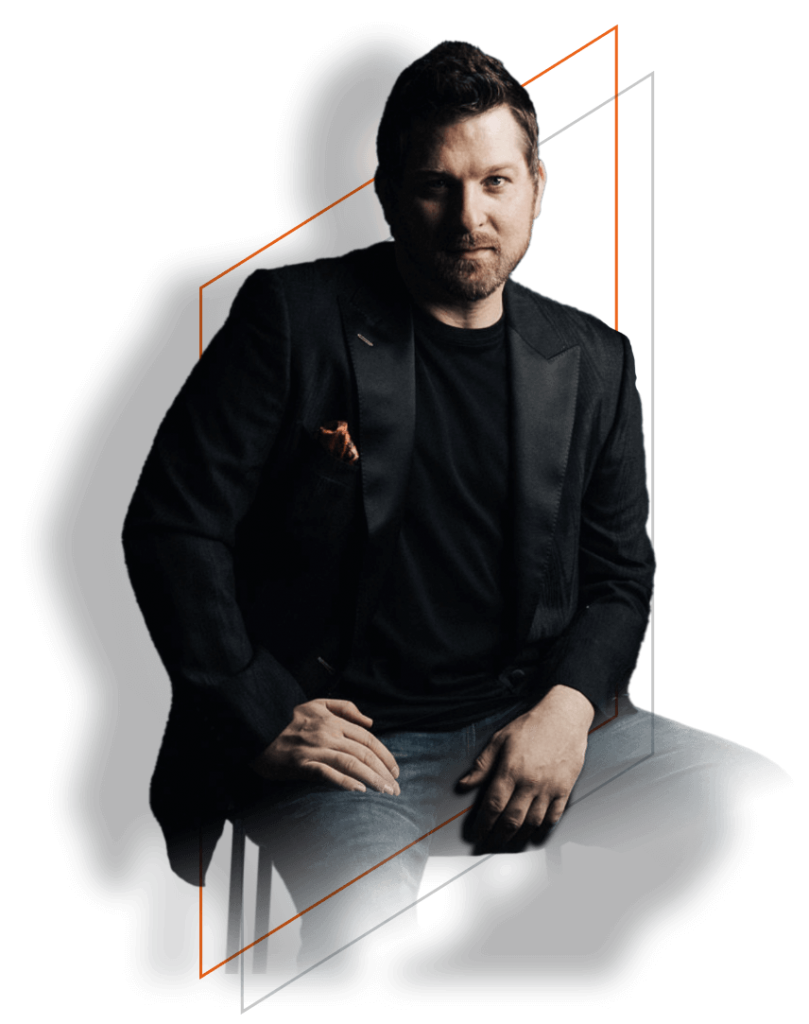The
Guiding Principles for
Growing & Scaling
MultiMillion-Dollar Businesses
These Are The 10 Guiding Principles That My Team and I Live and Die By Every Single Day As We Continue To Grow, Scale, and Acquire
Different
Multimillion-Dollar Companies

These 10 Guiding Principles are what I use as my “inner compass.”
They are the rules I choose to live by that help me run my life, and what I use to lead my Team and the companies we have in our portfolio.
While we’re constantly growing, expanding, and acquiring new companies, these are the things that always stay the same—the philosophies that never change, no matter what we do.
They are our central code of ethics—the core foundational beliefs that drive us to do everything we do in the world and for the world.
As you read through my Guiding Principles for life and business, I encourage you to apply the most useful ones to your own life and then work to define and clarify your own.
Getting clear on your top values and principles in life is truly one of the most important things you can ever do for yourself and your company.
My military experience taught me the dangers of leaving strategy to chance.
With lives on the line, there’s zero room for negligence, lazy thinking,
and risky trials.
I believe this same mindset applies to business. Why make stupid mistakes and costly errors if you can design rules of engagement that help you secure the battlespace?
That’s what these 10 Guiding Principles do for me and my Team.
They are the reason we can scale rapidly, innovate quickly, and get the kind of results that blow your mind.
Own your duty to be
the best possible version of who you are.
It frustrates me to see so much potential wasted. Too many people let themselves off the hook because losing is acceptable. They accept mediocrity and shrink away from being held accountable to do their best.
The military tasked us with taking over entire countries—and in our
anti-piracy work, whole continents. Why the fuck should we lower the
bar in business?
I believe every single one of us has genius. All of us have big-ass fucking goals, dreams, and aspirations to fulfill. We all have a 100% version of ourselves that we have the potential to become.
I don’t want to die and meet the man I was supposed to be. That would totally suck for me. I’ve got a very unique set of skills—skills that you don’t commonly find in the same person. It would be a damn shame if I didn’t live up to what my skills will allow me to accomplish if I stay focused. I know I’m here to have an impact and make the impossible possible for regular, everyday people. That’s why I believe it’s my duty, my responsibility, and my birthright to show up every day and give 100% of what I have to whoever needs me.
What about you? Are you going to let yourself off the hook and fall short of that 100%? Or are you going to accept your duty and do whatever it takes to be your best?
01

Accept that your fears
are bullshit.
You can’t operate at 100% if you’re in your own way. You have to believe in yourself. That’s why I’m proud of who I am and use this self-belief as rocket fuel. The reason most people don’t give 100% is that they don’t know what their 100% looks like. They’ve never been in a scenario that allowed them to find out. As a result, their vision is limited, they stay focused on the wrong things, or they get held back by fear or mindless thinking.
I understand that people have anxiety about things, but I believe fear is bullshit. It’s merely a lack of understanding, experience, and education—ALL of which you can fix.
So when you’re afraid of something, challenge your fears.
Look for the bullshit excuses that keep you hiding out, and transform them. Follow the fear to step into something bigger. It’s how you become someone who has no quit.
Play to win the dark.
I know what I’m here to do, and therefore I just have no quit.
I’m ready to fight the biggest fights because I’m here to change the world—and I know it’s going to take a lot of individual missions to win that war.
With the stakes so high, I will out-play, out-maneuver, and out-strategize anyone because I know the rhythm of winning will make me hungrier for the bigger victories.
And in the process, I plan to do a lot more than survive. I don’t want to just get by. I want to win every single battle of every single day—every single skirmish, every single war… I want to win it all (ethically and within the rules). Because saying that the sky’s the limit is small-brain thinking.
Maybe I can't see everything that's out there in the darkness, but I know there's a whole fucking universe beyond the sky.
03

Do it for a
greater good.
There’s so much work and so much you could do—so don’t just chase the money. Instead, desire to impact the world; then you’re only limited by what you’re willing to work for.
There’s a level of success that’s not measurable by a figure in a bank account. I can look in the mirror every single day and feel good about the Veterans I’ve helped. If I save one Veteran’s life, my entire existence will have been worth it—and I’ve already saved countless.
If you work to make an impact and help people, the money will follow. In comparison, if you’re chasing the money and doing it for the selfishness of your bank account, you’ll never make it. And if you do achieve success, there will be so many burned bridges behind you that you’ll destroy your options for later.
This is the difference a purpose-driven business makes. If you’re on a mission, the doors will always open for you.
Think about it… Which of the following will get you on the phone and bring in the money:
A target of $10 million OR a target of $10 million to ensure everyone has fresh water?
Lead with the mission, and you can start cold calling people with an inspiring request. In turn, you’ll have people signing up to give you money. You’ll have people contributing resources or offering to connect you with people who can help.
If you set out to impact people, not only will the money follow but people will jump on board to help you do that impactful thing. They’ll open doors you didn’t know existed. They’ll bring contracts you didn’t think you could land. They’ll make introductions to people you didn’t know could be in your corner.
Does your mission make you want to win the dark? If it doesn’t,
I suggest you go back to the drawing board and plan a new mission.
Your success depends on it.
the greater good.
Do it for the greater good.
I was in Iraq helping to rebuild the country after the overthrow of Saddam Hussein.
As part of a Team supporting the Iraqi police, we’d been helping to reinforce the police station. Together with the local police, we’d built a concrete wall around the station complete with a lookout, ballistic windows, and sandbags. It was vital the Iraqi police could conduct basic guard duty.
One day, my primary contact excitedly invited me to check out the
progress they’d made.
I suited up in all my gear: ballistic helmet, kevlar vest, ammo, guns—all of it. In comparison, my Iraqi friend was wearing polyester pants, a cotton shirt, and carrying a pistol.
Together, we stepped outside the concrete barrier and took a walk around the compound. He was proudly showing me all the outposts when suddenly a truck pulled up and started shooting at us.
I was desperately trying to shoot back, but the Iraqi policeman hugged me and pinned me to the wall. I was yelling at him to fire back, but he didn’t listen. I was so angry that back inside
the compound, I grabbed the interpreter.
I was still mad and aggressive and told the interpreter to say to the policeman that when people start shooting, it’s his job to shoot back and take enemies out of the fight.
The policeman looked at me and replied through the interpreter:
“If I die today, I’m just another dead Iraqi. If you die today, my country dies.”
That’s what a mission does for those invested. When people care about the stakes,
they’re willing to put everything on the line for the greater good.
Put livelihoods
on par with lives.
To me, losing in business is like losing in battle. I get this is an uncomfortable analogy for many, but business does have parallels to war. It’s why I bring a “do or die” attitude to business.
On the battlefield, there are lives on the line every single moment of every single day. With the stakes so high, everyone knows that there’s no margin for error. Everything has to be perfect.
Doesn’t your business have a heartbeat too?
Imagine what would be possible for your company if you protected livelihoods in the same way that you’d protect lives? How would you operate? What impact, growth, and wealth could you create if you brought this same tenacity to business?
I bet you’d make different decisions and take different actions.
For example, you wouldn’t declare bankruptcy, close a business down, and then open another one if you respected your company in the same way that you respect someone’s life.
In war, you do whatever’s necessary to get the assets you need. You get the people, bullets, guns, medics, suppliers—whatever it takes to protect lives. But in business, a lot of people won’t do the simple things necessary to get more sales. You can hardly get some entrepreneurs to send out a freakin’ email!
I believe entrepreneurs don’t put enough emphasis on the importance of livelihoods, and it’s a fatal mistake. They’re too easy to throw away, and that’s why businesses fail when they don’t need to.
We go to war to defend our freedom and protect our families. Isn’t this why you’re in business? Aren’t you fighting to gain freedom, time,
and opportunity?
If you want to be successful in business, you have to follow the rules of engagement to win market share and grow your company. Luckily, while you’re doing that, nobody is shooting at you and nothing is blowing up.
05

Problem-solving is
THE most important business skill.
Growing up, my Grandpa was a wonderful role model for me because he was strong enough as a man to let me fail. As long as it wasn’t going to kill me, he let me make my own mistakes so I could learn from them.
For example, if I said something like, “Grandpa, why don’t we bring the hay in this way instead of that way?” he’d let me do it the way that I wanted. If it got the same result in the same amount of time, that’s the way we would always do it from then on. If it didn’t work, usually I’d figure out why.
Grandpa taught me how to think and problem-solve, and he gave me the confidence to trust myself, give things a go, and lead the way. These skills have given me an unfair advantage in business.
In fact, I now believe that problem-solving is THE most important entrepreneurial skill.
EVERYTHING is a problem. If you can get to the problem-solving stage and you’re not frozen in fear, you can very quickly work your way through
pretty much any situation you’ll ever face in life. You can problem-solve
how to take a company from a thought all the way to a $100
million exit.
All you need to do is cultivate the ability to dissect what the problem actually is then work backward to create a plan to fix it, and you’ll be able to overcome any scenario.
Most entrepreneurs get stuck because they’re lost in fire-fighting mode and focused on the wrong things. They’re reactive instead of anticipating problems to solve. They get so focused and near-sighted that they’ll run right into a wall because they’re too busy looking at their feet.
Problem-solving skills help you figure out how to get on the roof of your business so you can see the bigger picture.
Most people only think about the very next step.
I play multiple games of chess at the same time.
Get yourself in a position where you can see the levers to pull, the roadblocks to avoid, and the opportunities that lie along different tracks, and you’ll create a level of success far beyond what you believe is possible.
So take a look at the problems you’re currently solving, and challenge yourself to think bigger. It’s a mission-critical activity that will determine
your fate.
Connect
to the right people
and you can acquire any asset or solve any problem.
If you’re the smartest person in the room, you’re in the wrong room.
Always surround yourself with people that know more than you do, and try to become one of their peers.
I’ve found relationship capital is one of the most valuable assets you can build—a lesson I learned in the military.
Reconnaissance is all about understanding the terrain and figuring out what’s out there. I’d build relationships with locals and make connections within the community so I could learn the secrets of the society and figure out who the key players were. Recon helps win wars and complete missions—and it applies to business too.
The reason I have such a badass network is that I’ve invested in it. I’ve found that when you help other people get what they want, the doors open for you. When I get in a room with somebody that is a higher level than I am in a particular area, I look for places where my skills can help them out then bring those skills full tilt without expecting anything in return. For example, I’ll get on the phone, and discover what they care about, or try to solve the problems they face in meaningful ways.
I’ve found that the more you give good karma, the more you get from it. Over time, the people you help slowly but surely realize you’re as valuable to them as they are to you. Then you can play with that synergy for mutual advantage. For example, you might start a mastermind together, get on stage at their event, or get an introduction or capital investment.
Thanks to the Law of Reciprocity, most people feel obligated to return favors at some point, but it’s a long-term game. I’m interested in what my actions will deliver over the next 20 years, not what comes back today.
If you’re looking to take advantage of your network, you’ll soon be squeezed out. But invest in it, and your network will reward you a million times over.
07

Work to help people
and the money will follow.
Raising money is all about building relationship capital.
After years of building relationship capital, I understand what investors are looking for.
For example, a lot of people who have money to invest will prioritize the impact their money can make over the return they can get. The people I’m connected with are willing to take more “risks” because they believe in the missions I’m fighting for, such as Veteran initiatives and ending human trafficking.
Cultivate the right relationships, and you’ll pre-qualify yourself when it comes to asking for money. For example, the people in my network know I wouldn’t ask for money if it wasn’t for a good reason, and because of our relationship, they’re more willing to invest. Investors often believe in me more than they do the project, and they’re willing to invest in me because they know I can put money in their pocket.
This is why I have a reputation for being able to raise huge sums of money.
Not only do I know the right people to ask but I’m in a position to ask because I’ve cultivated relationships that make people want to give
me money.
Raising money doesn’t have to be hard. It can be the easiest thing, but you have to put in the groundwork first. The question is, do you have the staying power to play the long game required to attract the big bucks? I do.
Hire the best people
and inspire them
to go above and beyond for the fight.
If you’re an entrepreneur without a Team, you’re screwed!
If you’re stuck micromanaging and doing everything yourself, you’ll never achieve your potential, because you’ll burn out or miss the opportunity to fight bigger battles.
I’m telling you, people are more important than the business. That doesn’t mean your business is inconsequential; it means everything can be worked out except people.
As a leader, it’s your job to build Teams that consist of the top 1% of people—then fire them up to their full potential. Unfortunately, not a lot of entrepreneurs know how to build these high-performing Teams. I need the members of my Team to be perfect at every moment. I don’t want them going through the motions. One person operating at less than 100% drags everyone else down. I tell my Team that I’d rather they call in sick so they can get their shit straight and come back tomorrow fighting rather than showing up today at 99%.
In the military, life-and-death situations mean you value Teams in a way that most people don’t. In the military, you’d die for each other. In a lot of workplaces, people are just out there for themselves.
When I’m hiring people, I only care about two things: Does this person have initiative, and does this person fit with the existing Rockstar Team I have? I don’t want people to take a ride with me. I want people who are ready to go to war and fight with me to gain battle space in the marketplace.
When you find the right people, you have to pay them well so they don’t lose their hunger.
I hire for results, never for hours.
Working to the clock sets you up to fail because it emphasizes the wrong thing. My core Team are all on six-figure salaries, and they deserve every penny. I’m willing to pay that kind of salary because I know I can get my people really fired up. I know I can get the highest performers in the world to do things they’ve never done before because I have a knack for opening their brain space to have big thoughts.
Most entrepreneurs never get 100% from their Team because they put them in a box, which stops their Team from using their initiative and brilliance. I don’t want mindless sheep, robots, or puppy dog employees who can catch the ball. I don’t want to stifle the growth of a business by keeping my Team locked to a checklist.
Instead, I want hungry people who can move the business forward without endless hand-holding from me. As a result, I have a fucking incredible Team. I have people who would get up in the middle of the night to launch a Facebook ad or restore a website—and not because I paid them to do it. Instead, it’s because they’ve learned who I am and what I’m willing to do for them and the mission—and they’re all in on it too.
Can you say the same for your Team? If not, what are you going to do about it?
09


Never take a
cookie-cutter approach to business.
Most entrepreneurs are so stuck in their day-to-day that it’s difficult for them to step back and see what they’ve built.
They think they’re building a Ferrari, but they’re not!
All businesses need the same core—including finances, good service, efficient operations, etc. But when it comes to growing or scaling a company, there isn’t a one-size-fits-all template, no matter what anyone tells you.
Growing a business is never a cookie-cutter approach. Instead, it’s determined on a case-by-case basis. For example, I start by mind-mapping the biggest levers to pull, identifying what we can optimize and what’s working already, and then add high-octane fuel to scale that business to the next step.
That fuel could be money, marketing dollars, automations, or even a task force.
Because I’m willing to respond to what an individual business needs, I can move quickly and I can move accurately. I don’t get hemmed in by a “proven” blueprint or template.
Instead, I come in with the right people, at the right time, with the right resources to get the right results. This is why our organization chart is built like a football team and not a ladder.
Most Teams are set up to function through a line of reporting. I’ve found this hierarchy can stifle people with potential because they’re limited to their position and reporting structure. I take a different approach. I hire self-sufficient people who are exceptional at what they do. This means that when it comes to pulling together a Team for a project, I can pick and choose the talent I need (just like a football manager) to put the best squad on the field to execute a specific play for the mission at hand.
Thanks to this flexibility, I’m agile enough to adapt to any battle in front of us—which is why my odds of winning are so damn high.
It can be tempting to trust the cookie-cutter approach. It’s easy to believe there’s a magic bullet or a quick fix, but be warned: You can’t win by fighting with a weapon that won’t shoot.
Your war deserves its own strategy, so don’t sabotage yourself by hunting down the shortcuts that will screw you over. Instead, take the time to understand what your business needs to win. You won’t regret this tactic for a second.
As you’ve just read, I believe livelihoods are as important as lives. As the business owner, you have a duty — a responsibility — to take good care of the people who depend on you.
Your Guiding Principles are the weapons that will help you fulfill the mission you signed up for to the best of your ability.
Now that you’ve read my 10 Guiding Principles, I urge you to create your own.
The survival of your business depends on it.





